|
|
 |
|
Cyclopoida ( Order ) |
|
|
|
Corycaeidae ( Family ) |
|
|
|
Corycaeus ( Genus ) |
|
|
|
Urocorycaeus ( Sub-Genus ) |
|
|
| |
Corycaeus (Urocorycaeus) longistylis Dana, 1849 (F,M) | |
| | | | | | | Syn.: | Corycäus longistylis Dana, 1849; 1852; Giesbrecht, 1892 (p.661, 674, figs.M);
C. varius Brady, 1883 (part., p.111, Pl.52: figs.7-8);
C. longistylus : Wolfenden, 1911 (p.359);
Urocorycaeus longistylis: Dessier, 1983 (p.89, Tableau 1, Rem., %); Boxshall & Halsey, 2004 (p.493); McKinnon & al., 2008 (p.844: Tab.1) | | | | Ref.: | | | F. Dahl, 1894 (p.70); Thompson, 1900 c (p.293); Thompson & Scott, 1903 (p.240, 286); Carl, 1907 (p.14, Descr. F, M, figs.F,M, Rem.); A. Scott, 1909 (p.249, Rem.); Farran, 1911 a (p.288); M. Dahl, 1912 (p.42, figs.F,M); Farran, 1929 (p.211, 293); 1936 a (p.136); Mori, 1937 (1964) (p.134, figs.F,M); Dakin & Colefax, 1940 (p.113, figs.M, Rem.); Sewell, 1947 (p.277, Rem.F); Tanaka, 1957 (p.83, figs.F,M); 1960 (p.78, Rem.M); Fagetti, 1962 (p.53); Motoda, 1963 (p.231, figs.F,M); Saraswathy, 1966 (1967) (p.102); Chen & al., 1974 (p.56, figs.F,M); Zheng & al., 1982 (p.139, figs.F,M); Kim & al., 1993 (p.271, as lonsgisty ); Chihara & Murano, 1997 (p.963, Pl.212: F,M); Bradford-Grieve & al., 1999 (p.888, 975, figs.F,M); Conway & al., 2003 (p.251, figs.F,M, Rem.); | 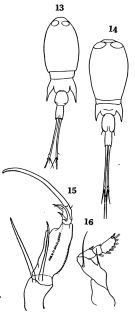 issued from : O. Tanaka in J. Fac. Agricult. Kyushu Univ., 1957, 11 (1). [Pl.5, Figs.13-16]. Female (from Japanese waters): 13, habitus (dorsal). Nota: Head and 1st thoracic segment fused, 3rd and 4th fused. The abdominal segments and furca in the proportional lengths 21:21:58. Dorsal surface of genital segment vaulted. Furcal ramus about 16 times as long as it is wide at the proximal. Male: 14, habitus (dorsal); 15, A2; 16, P4. Nota: The abdominal segments and furca in the proportional lengths 13:18. A2 with a row of small teeth on the outer margin and the median line of 2nd basal segment.
|
 issued from : Q.-c Chen & S.-z. Zhang & C.-s. Zhu in Studia Marina Sinica, 1974, 9. [Pl.16, Figs.1-5]. Female (from China Seas): 1, habitus (dorsal); 2, A2; 3, P4. Male: 4, habitus (dorsal); 5, A2.
|
 Issued from : W. Giesbrecht in Systematik und Faunistik der Pelagischen Copepoden des Golfes von Neapel und der angrenzenden Meeres-Abschnitte. – Fauna Flora Golf. Neapel, 1892. Atlas von 54 Tafeln. [Taf.51, Figs.36, 37]. As Corycäus longisstylis. Male: 36, urosome ( (ventral); 37, habitus (dorsal).
|
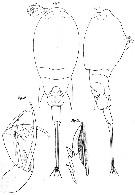 issued from : M. Dahl in Ergebnisse der Plankton-Expedition der Humbold-Stiftung. Bd II, G. f1. I. Die Corycaeinen 1912. [Taf. VI, Figs.6, 7, 10, 12]. Female: 6, habitus (dorsal); 7, habitus (dorsolateral right side); 10, A2; 12, P2 (distal part of exopod 3).
|
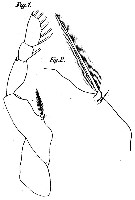 issued from : M. Dahl in Ergebnisse der Plankton-Expedition der Humboldt-Stiftung. Bd II, G. f1. I. Die Corycaeinen 1912. [Taf.VII, Figs.1, 2]. Female: 11, P4; 2, seta on P4.
|
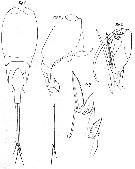 issued from : M. Dahl in Ergebnisse der Plankton-Expedition der Humboldt-Stiftung. Bd II, G. f1. I. Die Corycaeinen 1912. [Taf.VI, figs.8, 9, 11, 13]. Male: 8, habitus (dorsal); 9, idem (lateral right side); 11, A2; 13, P1 (distal part of exopod 3)
|
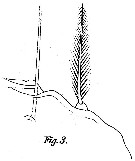 issued from : M. Dahl in Ergebnisse der Plankton-Expedition der Humboldt-Stiftung. Bd II, G. f1. I. Die Corycaeinen 1912. [Taf.VII, Fig.3]. Male: 3, seta on P4.
|
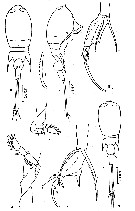 issued from : Z. Zheng, S. Li, S.J. Li & B. Chen in Marine planktonic copepods in Chinese waters. Shanghai Sc. Techn. Press, 1982 [p.139, Fig.87]. Female (from SE Korea): a-b, habitus (dorsal and lateral, respectively); c, A2; d, P4. Male: e, habitus (dorsal); f, ornamentation on the separation between the thoracic segments 2-3 ; g, A2; h, P4. Scale bars in mm.
|
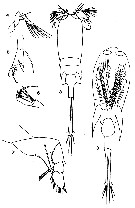 issued from : T. Mori in The pelagic Copepoda from the neighbouring waters of Japan, 1937 (1964). [Pl.73, Figs.3-8]. Female: 4, P4; 5, A2; 8, habitus (dorsal). Male: 3, habitus (dorsal); 6, A2; 7, P4.
|
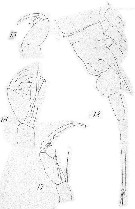 Issued from : J. Carl in Rev. Suisse Zool., 1907, 15. [Pl. I, figs.17-18]. Corycaeus longisstylis Female (from Baie d'Amboine = Ambon Bay, Indonesia):
| | | | | Compl. Ref.: | | | Carl, 1907 (p.18); Wilson, 1942 a (p.181); Sewell, 1948 (p.346, 434); C.B. Wilson, 1950 (p.195); Chiba & al., 1957 (p.312); 1957 a (p.12); Yamazi, 1958 (p.155, Rem.); De Decker, 1964 (p.15, 21, 27); De Decker & Mombeck, 1964 (p.12, as longistylus); Meenakshikunjamma, 1974 (p.771: zoogéo.); Guangshan & Honglin, 1984 (p.118, tab.); Yoo, 1991 (tab.1); Shih & Young, 1995 (p.76); Go & al., 1997 (tab.1); Park & Choi, 1997 (Appendix); Hsieh & Chiu, 1998 (tab.2); Noda & al., 1998 (p.55, Table 3, occurrence); Suarez-Morales & Gasca, 1998 a (p.112); Hwang & al., 2003 (p.193, tab.2); Lan & al., 2004 (p.332, tab.1); Lo & al., 2004 (p.218, fig.6); Lo & al., 2004 (p.89, tab.1); Hwang & al., 2006 (p.943, tabl. I); Hwang & al., 2007 (p.25); Tseng L.-C. & al., 2008 (p.46, table 2, abundance vs moonsons); Jitlang & al., 2008 (p.65, Table 1); McKinnon & al., 2008 (p.848: Tab. IV); Fernandes, 2008 (p.465, Tabl.2); Ayon & al., 2008 (p.238, Table 4: Peruvian samples); C.-Y. Lee & al., 2009 (p.151, Tab.2); Williamson & McGowan, 2010 (p.273, Table 3, Pacific central gyres: N and S); Hernandez-Trujillo & al., 2010 (p.913, Table 2); Tseng L.-C. & al., 2011 (p.47, Table 2, occurrences vs mesh sizes); Maiphae & Sa-ardrit, 2011 (p.641, Table 2, 3, Rem.); in CalCOFI regional list (MDO, Nov. 2013; M. Ohman, comm. pers.); Jagadeesan & al., 2013 (p.27, Table 3, seasonal abundance); Marquez-Rojas & al., 2014 (p.7, Rem., %) | | | | NZ: | 15 + 1 doubtful | | |
|
Distribution map of Corycaeus (Urocorycaeus) longistylis by geographical zones
|
| | | | | | | | | | | |  issued from : P.P. Meenakshikunjamma in J. mar. biol. Ass. India, 1974, 16 (3). [p.771, Fig.2]. issued from : P.P. Meenakshikunjamma in J. mar. biol. Ass. India, 1974, 16 (3). [p.771, Fig.2].
Distribution of Corycaeus (Urocorycaeus) longistylis in the Indian Ocean. |
| | | | Loc: | | | South Africa (E), off SE St. Helena Is., G. of Guinea, off St. Paul (S & NE), Venezuela, Cariaco Gulf, G. of Mexico, Cuba, ? Medit., Suez Canal, Red Sea, G. of Aden, Arabian Sea, Laccadive Is., Maldive Is., G. of Mannar, Palk Bay, Sri Lanka, Madagascar (Nosy Bé, SW), Rodrigues Is., Seychelles, Indian, Nicobar Is. ( Nankauri Harbour), Bay of Bengal, Christmas Is., G. of Thailand, Indonesia-Malaysia, Ambon Bay (Baie d'Amboine), Thaïland, Philippines, Viet-Nam, China Seas (Yellow Sea, East China Sea, South China Sea), Taiwan (S, SW, W, NW, N, Mienhua Canyon), Okinawa, S Korea, S Japan Sea, Japan, Kuchinoerabu Is., Tanabe Bay, Alaska, Aleutian Is., Bering Sea, Bikini, Marshall Is., off Hawaii, Pacif. (equatorial & tropical), W Baja California (Bahia Magdalena), Pacif. (W equatorial), Pacific (central gyres: N and S), Australia (North West Cape, Great Barrier, New South Wales), N New Zealand, Galapagos, Peru, off N Chile | | | | N: | 80 | | | | Lg.: | | | (34) F: 2,6; M: 2,24-2,16; (35) F: 2,88-2,76; M: 2,4-2,28; (46) M: 2,1-2; (66) M: 2,22; (104) M: 2,3; (91) F: ± 2,65; M: ± 2,28; (107) F: 2,8; M: 2,19-2,13; (109) F: 2,55-2,5; M: 2,12; (530) F: 2,4; (666) F: 2,565-2,497; M: 2,16-2,079; (667) F: 3,04-2,45; M: 2,72-2,3; (672) F: 3-2,8; M: 2,4-2,1; (786) F: 2,38; M: 2,1; (991) F: 2,45-3,04; M: 2,13-2,72; (1023) F: 2,56-2,61; M: 2,15-2,28; {F: 2,380-3,040; M: 2,000-2,720} | | | | Rem.: | C.B. Wilson (1950) reports this species in the extreme north of the Pacific.
According to Sewel (1947) this form, found aboard a ship (sampled from ballast water), at that time in the Mediterranean Sea, could in fact come from the Red Sea.
After Tanaka (1960, p.78) the male of this species found from the Indian Ocean present an anterior and posterior regions of the body in a proportional lengths as 48 to 52. The proportional lengths of the abdominal segment and caudal rami are as 40 to 60.
For Boxshall & Halsey (2004, p.491) the subgenus (Dahl, 1912) is considered as full generic status pending phylogenetic revision of the whole family at the generic level.
See in DVP Conway & al., 2003 (version 1) | | | Last update : 04/12/2020 | |
|
|
 Any use of this site for a publication will be mentioned with the following reference : Any use of this site for a publication will be mentioned with the following reference :
Razouls C., Desreumaux N., Kouwenberg J. and de Bovée F., 2005-2026. - Biodiversity of Marine Planktonic Copepods (morphology, geographical distribution and biological data). Sorbonne University, CNRS. Available at http://copepodes.obs-banyuls.fr/en [Accessed February 05, 2026] © copyright 2005-2026 Sorbonne University, CNRS
|
|
 |
 |














